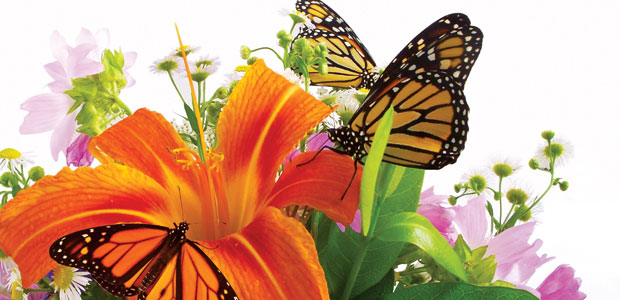Advertisement
A Better Bouquet of Blooming Organics
Good for you. You’ve decided to eat organic foods, as locally grown as possible. You have started your own organic backyard or balcony garden. You only drive your car when biking, walking, busing, or carpooling is impossible. You support environmental organizations and vote for the most environmentally dedicated political leaders. What more can a person … Continued

Good for you. You’ve decided to eat organic foods, as locally grown as possible. You have started your own organic backyard or balcony garden. You only drive your car when biking, walking, busing, or carpooling is impossible. You support environmental organizations and vote for the most environmentally dedicated political leaders.
What more can a person walking the organic path do? Well, the next time you bestow flowers (upon yourself or anyone else), give an organically grown or unsprayed bouquet or plant.
A Bouquet of Poisons?
A lovely bouquet of colourful, fragrant flowers is a classic gift for Mother’s Day and other special occasions. They look so fresh, vibrantly alive, and natural. What we can’t see are the many toxic poisons used in growing and processing that bouquet we so lovingly present to Mom.
In her book, The Flower Farmer: An Organic Grower’s Guide to Raising and Selling Cut Flowers (Chelsea Green Publishing, 1997), author Lynn Byczynski writes, “Many of the flowers sold by florists and supermarket floral departments have been imported from countries where the pesticide regulations are not as stringent as they are in the United States and Canada. As a result, many imported cut flowers have been sprayed with toxic chemicals to keep them cosmetically perfect, and those chemical residues are still on the flowers when they reach this country.”
In Canada when cut flowers and specialty plants arrive from out of country, government inspectors check for signs of disease and pests that could threaten our agriculture. But flower import inspectors do not check the levels of pesticide, herbicide, and fungicide residues that linger on the commercially grown flowers that may end up in the hands and homes of Canadians.
What’s a Flower Lover to Do?
Cristina King was born and raised on a certified organic farm and is now the floral buyer for Whole Foods in West Vancouver. “Flowers are the logical next step for many health-conscious people. If you care about what you eat and where it comes from, knowing everything you can about your flowers just makes sense.”
Offering four categories of specialty flowers–certified organic, logique (free of toxic chemicals), fair trade, and locally grown–80 percent of the flowers available at Whole Foods are from local sources.
Scott Graham, a floral designer and the owner of EcoFlora in the Toronto area is also dedicated to providing local, bioregional sources of seasonal flowers to his customers. Graham always considers the big picture when he chooses flowers for his shop.
“What is the origin of these flowers? What are the working conditions of the agricultural workers? What methods and chemicals were used in growing them? How far are they transported? Those are some of the questions we need answered in order to make truly healthy and ethical flower purchasing choices,” says Graham.
As we become more aware of the origins of our food, we begin to consider many other aspects of our daily lives. Choosing organic and local flower sources is yet another step on our path to living organically.
Flower Power
Five tips for the health-conscious flower buyer:
- Go to local farmer’s markets and meet the flower growers.
- Get friendly with your local florists. Tell them you will regularly buy organic flowers from as local a source as possible.
- When ordering flowers to send, contact florists in the region where you want the flowers delivered; tell them you prefer delivery of organic or unsprayed flowers.
- Choose a live, potted plant. Ask for unsprayed orchids, amaryllis, and cyclamen, long-lasting alternatives to cut flowers.
- Ask local flower growers to describe their growing techniques. Even if they are not organic growers, if they don’t use pesticides, herbicides, or fungicides, they’re a healthier source.




